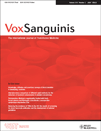
VOX SANGUINIS
Scope & Guideline
Advancing Hematology Through Innovative Research
Introduction
Aims and Scopes
- Transfusion Safety and Efficacy:
Research on practices and technologies that enhance the safety and effectiveness of blood transfusions, including pathogen reduction methods and risk assessment strategies. - Blood Donation Policies and Practices:
Exploration of donor eligibility criteria, recruitment strategies, and the impact of societal factors on blood donation rates and donor behavior. - Immunohematology and Blood Group Genetics:
Investigation into blood group antigens, genotyping, and their implications for transfusion compatibility and patient outcomes. - Patient Blood Management:
Studies aimed at optimizing transfusion practices and reducing unnecessary blood use, focusing on patient-centered care and outcomes. - Infectious Disease Monitoring:
Research on the prevalence of transfusion-transmitted infections and the effectiveness of screening methods to ensure blood safety. - Quality Improvement in Blood Services:
Development and implementation of quality improvement initiatives within blood services to enhance operational efficiency and donor safety. - Emerging Therapies and Technologies:
Investigation of novel therapies, including convalescent plasma and gene therapy, and their role in transfusion medicine.
Trending and Emerging
- Impact of COVID-19 on Blood Services:
A surge in research related to how the COVID-19 pandemic has affected blood donation rates, transfusion practices, and donor safety, highlighting the need for adaptive strategies in crisis situations. - Diversity and Inclusivity in Blood Donation:
Increased focus on improving inclusivity for diverse donor populations, including LGBTQ+ individuals, and addressing barriers to donation, indicating a broader societal awareness of equity in healthcare. - Advancements in Pathogen Reduction Technologies:
Emerging studies on novel pathogen reduction strategies and their implications for enhancing blood safety, reflecting ongoing technological innovations in the field. - Use of Machine Learning and Data Analytics:
Growing interest in employing machine learning and data analytics to predict transfusion outcomes and improve donor management, indicative of a trend towards data-driven decision-making. - Patient-Centric Transfusion Strategies:
Research emphasizing patient blood management and individualized care in transfusion practices, showcasing a shift towards patient-centered approaches in transfusion medicine. - Ethical Considerations in Blood Donation:
Emerging discussions around ethical issues related to blood donation, particularly in the context of new therapies and vulnerable populations, highlighting the importance of ethical frameworks in practice.
Declining or Waning
- Traditional Blood Transfusion Practices:
Research on standard transfusion practices is becoming less prevalent as newer, evidence-based approaches are developed and adopted, indicating a shift towards more innovative and patient-centered care. - Historical Perspectives on Transfusion Medicine:
Papers focused on historical analyses of transfusion practices and policies are appearing less frequently, suggesting a move towards contemporary issues and future directions in the field. - Generalized Risk Factors for Blood Donation:
Studies examining broad, non-specific risk factors for blood donation are decreasing as more targeted research on specific populations and conditions emerges. - Simple Blood Component Utilization Studies:
Basic descriptive studies on blood component utilization without in-depth analysis or innovative methods are less common, indicating a preference for more complex, data-driven studies.
Similar Journals

BLOOD REVIEWS
Advancing the frontiers of Hematology and Oncology.BLOOD REVIEWS is a highly regarded journal published by Churchill Livingstone, specializing in the fields of Hematology and Oncology. With an impressive Q1 ranking in both disciplines and placing in the top 10% of its peer categories according to Scopus metrics, it provides an essential platform for the dissemination of cutting-edge research and reviews pertaining to blood disorders and cancer treatment. Since its inception in 1987 and continuing through 2024, the journal has established itself as a cornerstone for healthcare professionals, researchers, and students who seek to advance their understanding of hematologic and oncologic topics. While not an open-access journal, BLOOD REVIEWS retains a reputation for delivering high-quality, peer-reviewed articles that foster dialogue and innovation within the scientific community. For those in the United States and beyond, the journal serves as a vital resource, housed at the Journal Production Department in Edinburgh, Scotland, ensuring accessibility and a global reach in its critical academic contributions.

Journal of Hematology
Bridging Knowledge Gaps in HematologyThe Journal of Hematology, published by ELMER PRESS INC, serves as a pivotal platform for disseminating cutting-edge research in the field of hematology. With an ISSN of 1927-1212 and an E-ISSN of 1927-1220, this journal is committed to advancing scientific knowledge and clinical practice through high-quality peer-reviewed articles encompassing all aspects of blood disorders, from basic science to health policy implications. While the journal currently operates under a traditional access model, it nonetheless prioritizes the rapid publication of significant findings, ensuring that researchers, clinicians, and students have timely access to the latest advancements in hematological research. Positioned to bridge gaps in knowledge and foster collaboration among scholars worldwide, the Journal of Hematology is an essential resource for anyone invested in this vital area of medicine.
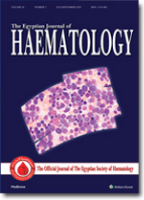
Egyptian Journal of Haematology
Empowering Hematologists with Cutting-Edge ResearchThe Egyptian Journal of Haematology, published by WOLTERS KLUWER MEDKNOW PUBLICATIONS, stands as a pivotal resource in the field of hematology, particularly within the context of Egypt and the broader Middle Eastern region. This journal is dedicated to disseminating high-quality research that explores the latest advancements in blood disorders, hematologic malignancies, and transfusion medicine. With a focus on original research, case studies, and reviews, it aims to provide a comprehensive platform for hematologists, researchers, and healthcare professionals to enhance their understanding and management of hematological conditions. Although it is not an open-access journal, the rigorous peer-review process ensures that only the most impactful studies are published, contributing to the journal's reputation in the academic community. The Egyptian Journal of Haematology serves as an essential tool for advancing knowledge, improving clinical outcomes, and fostering collaboration among experts in the field.

GEMATOLOGIYA I TRANSFUZIOLOGIYA
Bridging Research and Practice in HematologyGEMATOLOGIYA I TRANSFUZIOLOGIYA is an esteemed journal published by the MINISTERSTVO ZDRAVOOKHRANENIYA in the Russian Federation, focusing on the vital fields of hematology and transfusion medicine. With a rich history dating back to its inception in 1983, the journal plays a significant role in disseminating critical research and advancements in these areas, particularly relevant given the evolving landscape of medical science. As a recognized publication, it is indexed in Scopus and holds a Q4 category ranking in Hematology for 2023, reflecting its niche but important contributions to the field. Researchers, healthcare professionals, and students can look forward to a variety of peer-reviewed articles that not only address contemporary issues but also pave the way for innovative practices in hematology. Although it does not currently offer open access, the journal remains a valuable resource for those seeking to stay informed about the latest findings and developments.
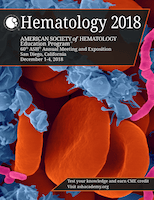
Hematology-American Society of Hematology Education Program
Transforming Hematology through Comprehensive LearningHematology-American Society of Hematology Education Program is a premier peer-reviewed journal dedicated to advancing the field of hematology through comprehensive educational content. Published by the American Society of Hematology, this journal plays a crucial role in disseminating knowledge to researchers, clinicians, and students in hematology and related disciplines. With an impressive Q1 status in the field, it ranks among the top journals at the forefront of hematological research, as evidenced by its 60th percentile ranking in Scopus' Medicine - Hematology category. Although it does not offer open access, the journal provides invaluable insights and educational resources from leading experts, focusing on the latest advancements, treatment protocols, and evolving understanding of blood disorders. Covering a wide range of topics, from basic research to clinical applications, this journal is essential for anyone seeking to deepen their expertise and stay informed on the latest developments in hematology. For further engagement, readers can access insightful articles published since 2001, ensuring a rich repository of knowledge for ongoing research and clinical excellence.
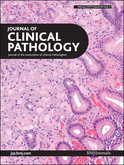
JOURNAL OF CLINICAL PATHOLOGY
Elevating Standards in Diagnostic ExcellenceJOURNAL OF CLINICAL PATHOLOGY, published by BMJ PUBLISHING GROUP, stands at the forefront of advancements in the field of clinical pathology, offering a platform for groundbreaking research and insights from 1948 to the present. With an impressive impact factor and categorized as Q1 in both Medicine (miscellaneous) and Pathology and Forensic Medicine for 2023, the journal holds a distinguished position in the academic community, ranking 22nd out of 208 journals in its category on Scopus and representing the 89th percentile. While the journal does not currently offer open access, it remains a vital resource for researchers, healthcare professionals, and students seeking to stay current with innovative methodologies, clinical techniques, and diagnostic advancements. Located in London, United Kingdom, the journal aims to bridge the gap between laboratory findings and clinical practice, emphasizing the importance of evidence-based pathology in improving patient care and treatment outcomes. Engage with the JOURNAL OF CLINICAL PATHOLOGY to enhance your understanding and contribute to the evolving landscape of clinical pathology research.
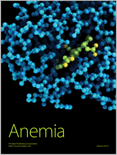
Anemia
Championing open access to transform hematological education and practice.Anemia is a distinguished open-access journal published by HINDAWI LTD, focusing on the intricate and vital field of hematology and related disciplines. Since its inception in 2010, this journal has been dedicated to advancing our understanding of blood disorders, with a particular emphasis on anemia, through the dissemination of high-quality research that is freely accessible to a global audience. The journal's evolving scope from its founding through 2024 embodies its commitment to include the latest breakthroughs and methodologies in cell biology and hematological research. With its presence in prestigious databases and a tiered ranking that places it in the Q3 category in Hematology and Q4 in Cell Biology as of 2023, Anemia serves as an invaluable resource for researchers, clinicians, and students alike. The journal is indexed with a respectable position in Scopus, ranking 52 out of 137 in Hematology, highlighting its growing influence in the medical and scientific communities. With continued emphasis on open access, Anemia not only fosters collaborative research but also ensures that crucial findings reach those who need them most, enhancing educational outcomes and clinical practices worldwide.

Blood Research
Illuminating the Path in Blood Research and Patient CareBlood Research, published by SPRINGER, is a premier journal dedicated to the multifaceted realm of hematology, serving as a crucial platform for disseminating innovative research findings and advancements in the diagnosis and treatment of blood-related disorders. With an ISSN of 2287-979X and an E-ISSN of 2288-0011, this journal is recognized for its commitment to scholarly excellence and impact in the field, currently holding a reputable Q2 ranking in the Hematology category as per the 2023 metrics. The journal spans from 2013 to 2024, providing a broad archive of quality research that is vital for researchers, healthcare professionals, and students alike. Although it is not an Open Access journal, it offers insightful contributions that enhance the understanding of hematological science, fostering the exchange of knowledge crucial for advancing patient care and clinical practices globally. The journal’s performance is underscored by its Scopus ranking in the 46th percentile, reflecting its significant role in the ongoing discourse in hematology.
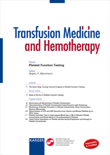
TRANSFUSION MEDICINE AND HEMOTHERAPY
Transforming patient care through cutting-edge research.TRANSFUSION MEDICINE AND HEMOTHERAPY, published by KARGER, is a prominent journal dedicated to advancing the fields of hematology and transfusion medicine. With an ISSN of 1660-3796 and E-ISSN 1660-3818, this esteemed journal has been a valuable resource for researchers and clinicians since its inception in 1973, with significant publication phases continuing into 2024. It currently holds a Q2 ranking in Hematology and a Q3 ranking in Immunology and Allergy, reflecting its impact and relevance in these critical fields. The journal features original articles, reviews, and clinical studies, presenting cutting-edge research that aids in the development of effective therapies and enhances patient care. Open access options are available, ensuring that crucial findings are accessible to a broad audience. As an important platform for dialogue and advancement in transfusion science, TRANSFUSION MEDICINE AND HEMOTHERAPY supports the global health community's efforts to improve treatment outcomes and foster innovation in medical practices.
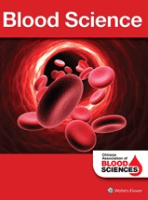
Blood Science
Exploring the Frontiers of Blood ScienceBlood Science is a distinguished peer-reviewed journal published by Lippincott Williams & Wilkins, focusing on the dynamic field of hematology. Since its inception, the journal has aimed to disseminate high-quality research and innovative findings that contribute to our understanding of blood-related health issues. With the ISSN 2543-6368, it offers a platform for academic discussions and breakthroughs in various subfields including hematopathology, blood disorders, and transfusion medicine. As of 2023, Blood Science is ranked in the third quartile (Q3) within the hematology category, indicating a burgeoning influence among its peers, with a Scopus rank of #101 out of 137 journals, placing it in the 26th percentile. Although it is not an open-access journal, it provides essential insights and valuable data for researchers, healthcare professionals, and students alike, enhancing the collective knowledge and practices in hematology. With a publication period spanning from 2019 to 2024, Blood Science remains committed to fostering the advancement of blood science research and enhancing patient care methodologies.